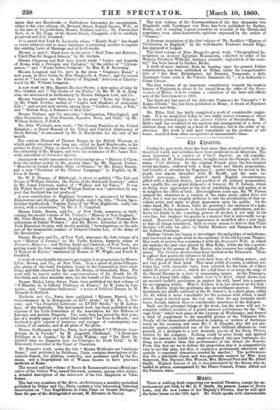Mljt it#tairrs.
During the past week, there has been more than wonted activity in the theatrical world, and novelties have been produced in all directions. The most important is a version of Oncle Baptiste, an old comedie- vaudeville, by M. Emile Souvestre, brought out at the Olympic, with the name, Uncle Zachary. In the original French piece the free-hearted jovial mechanic, endowed with a large heart and thirsty propensities, and brimful of adoration for Napoleon I., under whom he served in his youth, was almost identified with M. &QS, and the same ex- cellent personage, firmly planted amid English circumstances, gifted with a Kentish dialect, and purified of all military propensities, now equally fits our grand delineator of humour, Mr. F. Robson, whom no living actor approaches in the art of combining fun and pathos so as to heighten the effect of both. About eighteen years ago, Mr. W. Farren essayed the character in a version of the same piece, called Peter and Paul, but it was too roughly plebeian to suit the peculiarities of that ex- cellent artist, and made no great impression upon the public. On the other hand, Mr. F. Robson, while he pourtrays the emotions of a man, who vulgar in his manners is keenly susceptible to unkindness, and be- lieves too firmly in the consoling powers of alcohol, is not only in his own line, but employs his genius in a manner that is universally recog- nized. Moreover, his outward appearance is modelled after a new type, so that all things considered, there is every reason to believe that Uncle Zachary will take his place by Daddy Hardacre and Sampson Burr in the Robson Pantheon.
Madame Celeste has begun to investigate the antiquities of melodrame, and has found an ample stock in the repertory of the old Lyceum Theatre. Her work of revival has commenced with the Sergeant's Wife, in which she sustains the part once played by Miss Kelly, while she has a power- ful adjunct in the person of Mrs. Keeley, who resumes her original cha- racter. The Corsican Brothers has been revived at the Princess's. There is a ghost that positively refuses to be laid.
The other productions of the week have been of a trifling nature, and not very good of their kind. That most awful of events, a railway, col- lision has, with execrable taste, been selected for the basis of a farce called Frightful Accident, which for a full hour or so keeps the stage of the Strand Theatre in a state of unmeaning uproar. At the Princess's, there is a flimsy little affair, called Cruel to be Kind, which shows how an uncouth bashful gentleman is, against his will, lured into a passion for an engaging widow. Miss C. Leclerq is in her •element as the lady ; Mr. A. Harris plays the gentleman like an intelligent amateur. Private theatricals are mildly satirized at the St. James's, in a short piece, called No. 49, which is more remarkable for the neatness with which a small mimic stage is erected upon the real one, than for any dramatic excel- lence, though, indeed, there is considerable smartness in the dialogue. Such are the principal doings of the week, but the news will not be complete without mention of a grand amateur performance by the "Sa- vage Club," which took place at the Lyceum on Wednesday, and formed a kind of supplement to the manifold glories of the Volunteer fête. Nearly all the dramatists celebrated in London, or writers of burlesque acted on the occasion, and even Mr. J. R. Pianehe who did not per- sonally appear, contributed one of the most brilliant effusions he ever penned, as a prologue to a new dramatic parody of the Forty Thieves, written by the company. Nothing could be more lively and spirited than the manner in which the amateurs played this new burlesque, no- thing more sombre than this performance of the School for Scandal. From this fact are we to deduce the proposition that it is comparatively easy to act this play, but that it requires a professional education ade- quately to represent characters created by another ? The performance was for a charitable object, and was graciously assisted by Miss Amy Sedgwick, Mm. Poynter, Mrs. Weston, Mrs. Howard Paul and Mr. Albert Smith. Highest honour of all, it was patronized by the Queen who at- tended in person, accompanied by the Prince Consort, Prince Alfred and the Princess Alice.


























 Previous page
Previous page